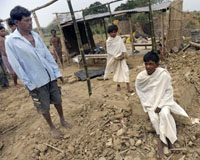 |
United Nations (AFP) Sept 29, 2010 India's foreign minister said Wednesday that Pakistan-sponsored attacks in Kashmir are underpinning a "trust deficit" that is holding up efforts to improve relations between the nuclear-armed neighbors. S.M. Krishna told the UN General Assembly that India shares international concerns about "the growth and consolidation of militancy and terrorism in Pakistan." The Indian minister spoke one day after his Pakistani counterpart Shah Mehmood Qureshi expressed "grave concern" to the assembly about events in Indian Kashmir, the bitterest source of tensions between the two rivals. Krishna said that Jammu and Kashmir "is the target of such Pakistan-sponsored militancy and terrorism. "Pakistan must fulfill its solemn commitment of not allowing territory under its control to be used for terrorism directed against India," the minister declared. "Pakistan cannot impart lessons to us on democracy and human rights. If, however, Pakistan were to live up to its commitment not to allow use of its soil by terrorists acting against India this would significantly help reduce the trust deficit that impedes the development of better bilateral relations." India has an estimated 500,000 troops in Kashmir, which is split into Indian- and Pakistani-administered parts. There has been a separatist insurgency in the Indian zone for 20 years. India and Pakistan claim the mountainous region in full, and the territory has been the cause of two of the three wars the countries have fought since independence from Britain more than half a century ago.
earlier related report Manmohan Singh described the start of the process, expected to cost billions of dollars over the coming years, as a "special moment" that would empower the most marginalised in society. "It will help strengthen the rights of the downtrodden and the poorest, including women," he said. The government plans to give every member of the 1.16-billion population a 12-digit number in the coming years after they submit their personal details, including fingerprints, an iris scan and photograph. The project is hailed as the world's first ID scheme using biometric-based data on a national scale and is overseen by Nandan M. Nilekani, the former co-chairman of India's second-largest software exporters Infosys Technologies. It is aimed at cutting fraud and improving access to state benefits, while also simplifying the identification process for citizens, who are often asked for multiple forms of ID. The prime minister said the scheme would also allow people -- the majority of whom are illiterate labourers or farmers -- to secure bank loans and open bank accounts as well find work across the country. The first recipients were 10 people in Tembhli village, more than 200 miles (320 kilometres) northeast of the state capital Mumbai, where Singh was accompanied by the head of the ruling Congress party Sonia Gandhi. Among the recipients were three children -- two boys aged four and eight and a 14-year-old girl -- as well as men in white homespun cotton shirts and women in saris, who all touched the feet of the dignitaries as a mark of respect. Gandhi said in a speech that the launch was a "new beginning" for India. There are various estimates about how much the new system will cost, from six billion dollars to 32 billion. Nilekani has refused to discuss the budget, but 400 million dollars has been allocated to the scheme in 2010-11, according to the Unique Identification Authority of India (UIDAI) website. The agency said the new numbers would provide "a cost-effective, ubiquitous authentification infrastructure to easily verify... identities online and in real-time". Huge swathes of Indians, particularly the rural poor, face difficulties accessing state benefits like subsidised food programmes because of a lack of documentation. The "Aadhaar" (base number) scheme would help remove such problems and provide "a nationally valid and verifiable single source of identity proof, the agency said. Fingerprints and iris recognition "will help agencies and service providers across India clean out duplicates and fakes from their databases", it added. The Economic Times newspaper quoted one villager as saying: "It will help our children when getting them admitted to the village school. It will help us in getting rations anywhere we go. It will also help us get employment." A 100-rupee (2.20-dollar) incentive was on offer for people to sign up for the scheme. Financial newspaper Mint quoted an unnamed UIDAI official as saying: "We have been enrolling around 300 to 350 people every day since September 20 and until now around 1,500 people's biometric data has been recorded." Critics have questioned whether the government will be able to compile an accurate, updated record of India's teeming population and fear the misuse of personal information by officials and individuals. Supporters of the scheme point to the benefits of simplification if the process is carried out successfully. Much official business in India is still done using triplicate, hand-written forms rather than computers, causing frustration, confusion, errors and delays.
Share This Article With Planet Earth
Related Links The Long War - Doctrine and Application
 India's ID scheme launched in tribal village
India's ID scheme launched in tribal villageMumbai (AFP) Sept 29, 2010 India's prime minister launched the country's hugely ambitious national identification scheme on Wednesday, handing the first unique numbers to locals in a remote and impoverished tribal village. Manmohan Singh described the start of the process, expected to cost billions of dollars over the coming years, as a "special moment" that would empower the most marginalised in society. "It will ... read more |
|
| The content herein, unless otherwise known to be public domain, are Copyright 1995-2010 - SpaceDaily. AFP and UPI Wire Stories are copyright Agence France-Presse and United Press International. ESA Portal Reports are copyright European Space Agency. All NASA sourced material is public domain. Additional copyrights may apply in whole or part to other bona fide parties. Advertising does not imply endorsement,agreement or approval of any opinions, statements or information provided by SpaceDaily on any Web page published or hosted by SpaceDaily. Privacy Statement |